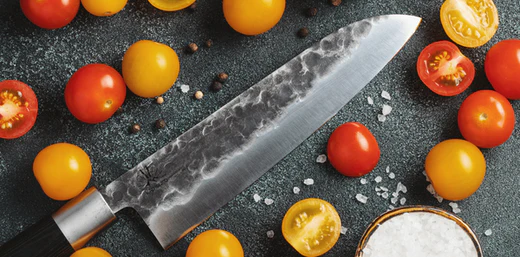The Advantages of Damascus Blades
The world of knives is vast and fascinating, ranging from simple kitchen knives to traditional Japanese knives. Among the many varieties, Damascus knives hold a special place because of their unique characteristics and appealing aesthetics. In this article, we will explore the advantages of Damascus blades and why they are so highly valued by chefs and knife enthusiasts.
The Making of Damascus Blades
Damascus blades are made from multiple layers of steel of different qualities, which are then forged together to create a distinctive pattern. The manufacturing process typically involves stacking at least two types of steels, often high-carbon steel and stainless steel. This ancient technique dates back to the era of Middle Eastern blacksmiths who forged swords and other weapons using this type of steel.
Forging Damascus Steel
The manufacturing process begins by alternately stacking the two types of steel. This stack is then heated and hammered, causing the diffusion of carbon atoms between the steel layers. When the forging temperature is correctly controlled, the steels weld together, creating a solid block of composite steel.
Once the block is formed, it is folded and hammered multiple times to create a spiral or wave pattern. This pattern is what visually distinguishes Damascus steel from other types of steel.
Unique Characteristics of Damascus Blades
Damascus blades are appreciated for their distinctive patterns and aesthetics, but they also offer practical advantages in terms of performance and durability.
Exceptional Cutting Edge
One of the main advantages of Damascus blades is their sharpness. Due to the alternation of hard and soft steel layers, the blade can be honed to an exceedingly sharp edge. This allows the knife to easily cut even the most delicate foods, with precision and finesse that cannot be matched by ordinary steel knives.
Great Durability
Damascus blades are also renowned for their durability. The layered manufacturing process creates corrosion-resistant and shock-resistant steel. Therefore, Damascus blades are less likely to break or warp, making them more durable than ordinary steel knives.
Unique Aesthetics
Finally, the patterns created by forging Damascus blades are unique and often considered true works of art. Each blade is different, depending on the techniques used and the steels chosen by the blacksmith. The patterns may be simple or complex, but they always add an attractive aesthetic dimension to the knife.
Damascus Knives in the Kitchen
Damascus blades are particularly favoured for cooking and are often used by professional chefs and quality knife enthusiasts. Damascus knives are available in a wide variety of styles, ranging from Japanese chef's knives to vegetable knives.
Japanese Knives in Damascus Steel
Japanese knives in Damascus steel are very popular due to their exceptional sharpness and lightness. Japanese chef's knives in Damascus steel are often considered the best kitchen knives on the market, offering a perfect balance between sharpness and durability.
Using Damascus Knives in the Kitchen
Damascus knives are ideal for cooking because they allow for precise cutting with minimal effort. Their exceptional sharpness enables fine and delicate cuts, such as filleting fish, cutting sashimi, or preparing vegetables.
In conclusion, Damascus blades offer many advantages, both aesthetically and practically. Their exceptional sharpness, durability, and unique aesthetics make them a top choice for chefs and quality knife enthusiasts. If you are looking for a knife that combines beauty and performance, Damascus steel is the perfect answer.
FAQ
What is the composition of Damascus blades?
Damascus blades are made up of two different layers of metal, usually a steel alloy or another metal. The layers are fused together to create a unique and distinctive pattern, giving the Damascus blade its visual characteristic.
What are the advantages of Damascus blades?
Damascus blades offer high strength and exceptional durability, as their different metal layers are fused together to create a single solid blade. They are very strong and can withstand significant impacts without breaking or cracking. Moreover, they stay sharper for longer than ordinary steel blades.
Are Damascus blades easy to maintain?
Yes, Damascus blades are relatively easy to maintain. You can simply clean them with soap and warm water to remove any dirt and oil accumulated on the blade. It is also recommended to have the blade polished regularly to maintain its quality and durability.
How can I recognize a Damascus blade?
A Damascus blade has a distinct appearance that can be easily identified. It has a unique pattern made up of two different metal layers fused together. The layers usually have different colours, giving the blade a distinctive look.
Are there any disadvantages to using Damascus blades?
Damascus blades tend to be more expensive than other types of blades due to their excellent durability and resilience. They can also be hard to find as they are not manufactured by all makers. Moreover, they do not offer as many options in style and design as some other blades.


How Do the Japanese Cut Cheese?
Ramune, The Best Japanese Drink